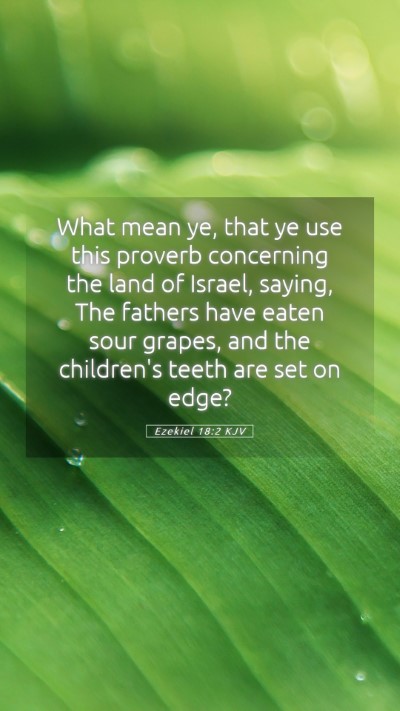Bible Verse Commentary on Ezekiel 18:2
Verse Reference: Ezekiel 18:2 - "What do you mean when you use this proverb concerning the land of Israel, saying: 'The fathers have eaten sour grapes, and the children's teeth are set on edge'?"
Understanding the Context
This verse occurs within a larger message that God is communicating to His people through the prophet Ezekiel. After the Israelites faced judgment and exile, they began to express their suffering through a proverb suggesting that their current state was due to the sins of their ancestors. This commentary aims to explore the implications of this proverb and the responses it provoked.
Insights from Public Domain Commentaries
Matthew Henry's Commentary
Matthew Henry emphasizes that this proverb reflects a common misconception among the Israelites. They believed that they were suffering for the sins of their forefathers, which highlights their misunderstanding of personal responsibility. Henry underscores that God's justice does not punish children for the iniquities of their parents. Instead, each person is accountable for their own actions.
Albert Barnes' Notes on the Bible
Albert Barnes interprets this verse as a critical rebuke to the people of Israel. He notes that by invoking this proverb, they were attempting to shift blame and deny their own complicity in sin. Barnes argues that God challenges this notion, asserting that every individual is responsible for their own moral choices and cannot pass the consequences onto others.
Adam Clarke's Commentary
According to Adam Clarke, the proverb speaks to a deep-seated belief in fate and inherited guilt, which he argues is inconsistent with God's character. Clarke insists that God’s judgment is based on present actions rather than ancestral sin. He elaborates that this verse serves as a prelude to God's call for personal repentance and renewal, reinforcing that God desires a relationship with each individual based on their own faith and deeds.
Key Themes in Ezekiel 18:2
- Personal Responsibility: The verse underscores the principle that every person is responsible for their own actions and cannot blame the former generations.
- The Nature of God's Justice: God's justice is portrayed as fair and just, where each individual faces the consequences of their choices.
- Call to Repentance: This statement from God is part of a larger call for the people of Israel to turn back to Him and seek forgiveness.
Application of the Verse
In applying Ezekiel 18:2 to modern life, we learn about the importance of owning our actions and the need for repentance. In a world where blame-shifting is common, this verse serves as a reminder to take personal accountability for our decisions. Additionally, it encourages us to reflect on our spiritual state rather than attributing our challenges to past generations.
Cross References
- Deuteronomy 24:16: "Fathers shall not be put to death for their children, nor children be put to death for their fathers: every man shall be put to death for his own sin."
- Jeremiah 31:30: "But every one shall die for his own iniquity: every man that eateth the sour grape, his teeth shall be set on edge."
- Romans 14:12: "So then every one of us shall give account of himself to God."
Conclusion
In conclusion, Ezekiel 18:2 serves as a profound reminder of the need for personal accountability in our spiritual lives. Understanding this verse through Biblical commentaries enriches our comprehension and facilitates deeper Bible study insights. As we explore its implications, we are called to reject the tendency to blame others for our circumstances and to embrace the call to personal repentance and renewal in our walk with God.
This analysis also fits within wider topics applicable for Bible study groups, online Bible studies, and various Bible study tools and materials aimed at fostering a more profound understanding of Scripture.


